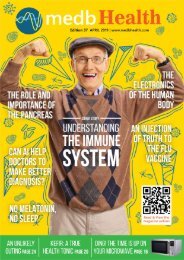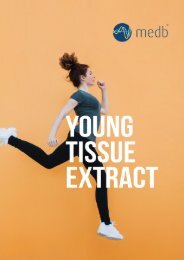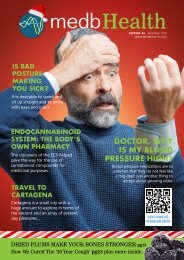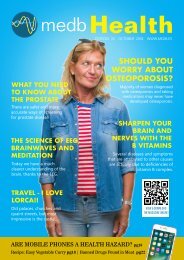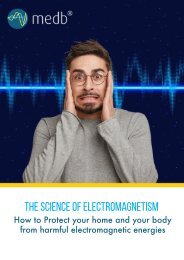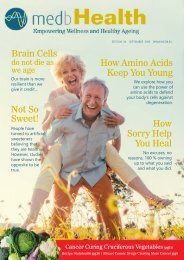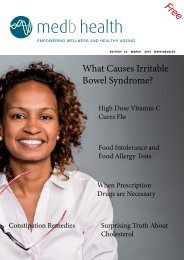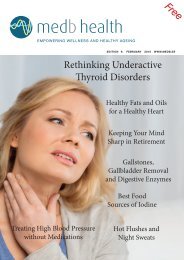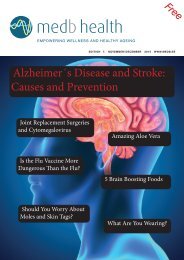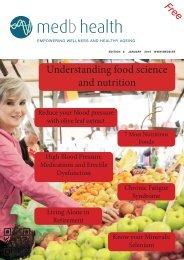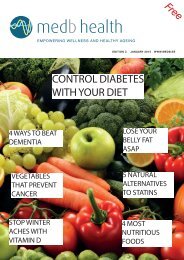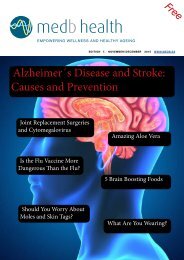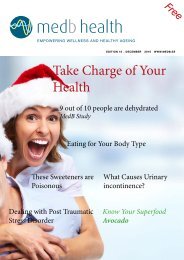You also want an ePaper? Increase the reach of your titles
YUMPU automatically turns print PDFs into web optimized ePapers that Google loves.
I am 74 years old. 4 months ago I<br />
suffered a stroke that left me partially<br />
paralysed and unable to speak <strong>for</strong> a<br />
few hours. Since <strong>the</strong>n my memory<br />
hasn’t been <strong>the</strong> same. I´ve noticed<br />
that I´ve become more <strong>for</strong>getful and<br />
have a harder time recalling recent<br />
events. For <strong>the</strong> stroke, I was<br />
prescribed amlodipine, statins, and<br />
aspirin.<br />
You may be surpr<strong>is</strong>ed to hear that <strong>the</strong><br />
medications you’re taking are doing very<br />
little to prevent <strong>the</strong> recurrence of ano<strong>the</strong>r<br />
stroke, nei<strong>the</strong>r are <strong>the</strong>y helping in your recovery.<br />
These medications are still prescribed based on an<br />
outdated model of <strong>the</strong> body which compares <strong>the</strong><br />
blood vessels to pipes. Today we understand that<br />
what goes on in arteries <strong>is</strong> more complex than what<br />
happens with clogged pipes.<br />
Strokes occur when a brain artery becomes blocked<br />
from plaque build-up on <strong>the</strong> walls of <strong>the</strong> arteries.<br />
The main source of plaque on artery walls <strong>is</strong> clotting<br />
cells that migrate to injuries on <strong>the</strong> walls of<br />
arteries, gradually building up and eventually<br />
causing blockages. The cause of injuries to <strong>the</strong> walls<br />
of arteries <strong>is</strong> inflammation. Inflammation <strong>is</strong><br />
ano<strong>the</strong>r name <strong>for</strong> cell injury.<br />
Contrary to popular assumption, cholesterol <strong>is</strong><br />
one of <strong>the</strong> most useful compounds in <strong>the</strong> body and<br />
<strong>the</strong>re <strong>is</strong> no such thing as good or bad cholesterol.<br />
Cholesterol <strong>is</strong> like a drug produced by <strong>the</strong> body <strong>for</strong><br />
fighting inflammation and repairing t<strong>is</strong>sue damage.<br />
Cholesterol <strong>is</strong> not <strong>the</strong> cause of blocked arteries.<br />
The medications you´re taking may be causing more<br />
harm than good especially <strong>the</strong> statins <strong>for</strong> lowering<br />
cholesterol. Statins are without a doubt one of <strong>the</strong><br />
worst drugs prescribed today.<br />
Statins not only lowers cholesterol but also lowers<br />
one of <strong>the</strong> most vital chemicals <strong>for</strong> <strong>the</strong> heart<br />
Coenzyme Q10 (CoQ10). CoQ10 <strong>is</strong> needed by all<br />
cells in <strong>the</strong> body <strong>for</strong> generating energy, especially<br />
<strong>the</strong> active cells such as <strong>the</strong> heart. Low CoQ10 levels<br />
in <strong>the</strong> body <strong>is</strong> associated with chronic heart<br />
d<strong>is</strong>eases including heart failure and heart attacks.<br />
Some of <strong>the</strong> common harmful effects of Statins<br />
Q & A<br />
include muscle and joint pain, chest pain, nerve<br />
damage, liver and kidney d<strong>is</strong>eases. Cholesterol <strong>is</strong><br />
essential <strong>for</strong> normal brain function, and it comes as<br />
no surpr<strong>is</strong>e that statins cause many brain<br />
d<strong>is</strong>orders, including memory loss, depression, insomnia,<br />
irritability, irrational violence and<br />
aggression.<br />
Thinning <strong>the</strong> blood with aspirin while <strong>the</strong> arteries<br />
continue to block <strong>is</strong> a poor management strategy.<br />
The damage caused by aspirin far outweighs any<br />
likelihood of thinning <strong>the</strong> blood to prevent strokes.<br />
The long-term use of aspirin causes severe<br />
damage to <strong>the</strong> stomach, liver and kidneys. .<br />
The aim of stroke management should be to<br />
identify, treat, and control <strong>the</strong> sources of<br />
inflammation. There´s also <strong>the</strong> need to d<strong>is</strong>solve<br />
already <strong>for</strong>med plaque on arteries. Unhealthy<br />
nutrition <strong>is</strong> a major cause of inflammation in <strong>the</strong><br />
body, especially <strong>the</strong> consumption of vegetable oils<br />
such as sunflower and canola oils. O<strong>the</strong>r important<br />
causes of inflammation include toxins from industrial<br />
chemicals and everyday household items.<br />
Plaque in Arteries can be removed with a natural<br />
enzyme called serrapeptase (See Page 2)<br />
People worried about high cholesterol such as those<br />
with a strong family h<strong>is</strong>tory should check <strong>the</strong>ir<br />
cholesterol levels every 3 to 4 months and if high,<br />
should take a natural cholesterol regulator such as<br />
policosanol, <strong>for</strong> a few months.<br />
My advice <strong>is</strong> to stop <strong>the</strong> statins and aspirin but to<br />
keep an eye on your blood pressure and<br />
cholesterol levels.<br />
10 www.medb.es




